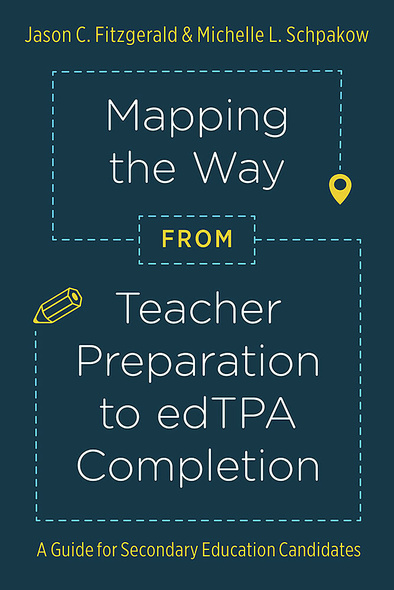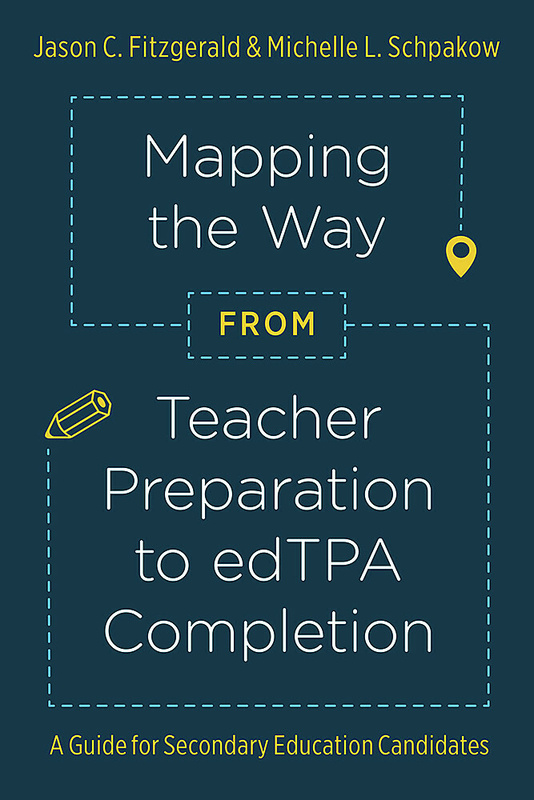
216 pages, 5 1/2 x 8 1/2
16 b-w images, 3 tables
Paperback
Release Date:18 Jun 2021
ISBN:9781978821972
Hardcover
Release Date:18 Jun 2021
ISBN:9781978821989
Mapping the Way from Teacher Preparation to edTPA® Completion
A Guide for Secondary Education Candidates
Rutgers University Press
As nationwide calls for educational rigor and accountability continue across the U.S., many states have made the edTPA®, a teacher performance assessment, a requirement for teacher certification. The edTPA® is a subject-specific performance assessment that requires aspiring teachers to plan, implement, assess, and reflect upon a learning segment, while demonstrating pedagogical skills related to their disciplines. While it is designed to promote teaching excellence, the edTPA® can drive already-stressed teacher candidates to their breaking point, as it places them in an unfamiliar classroom and asks them to quickly display their knowledge and savvy.
This book is here to help teacher candidates not only survive the challenge of the edTPA®, but also thrive. It maps out precisely what steps aspiring secondary education teachers should take to ensure successful completion of the edTPA®. Demystifying the language used in the assessment, it uniquely connects edTPA® requirements with what teacher candidates learn within their teacher preparation programs, showing them how the assessment relates to what they are already doing in their classrooms. The strategies in this book draw on both academic research and practical experience to guide student teachers as they plan for their edTPA® portfolios and for their teaching careers beyond.
This book is here to help teacher candidates not only survive the challenge of the edTPA®, but also thrive. It maps out precisely what steps aspiring secondary education teachers should take to ensure successful completion of the edTPA®. Demystifying the language used in the assessment, it uniquely connects edTPA® requirements with what teacher candidates learn within their teacher preparation programs, showing them how the assessment relates to what they are already doing in their classrooms. The strategies in this book draw on both academic research and practical experience to guide student teachers as they plan for their edTPA® portfolios and for their teaching careers beyond.
A keen deconstruction of the learning segment alongside guidance that connects theory, preparation, and practice. Preservice teachers and programs will find this text integral in preparing for the performance assessment.
As a pre-service teacher educator and edTPA coordinator I was very appreciative of the authors purposeful progression of their outlined chapters. The content of this book places emphasis on educative needs of teacher preparation, with a strong introduction to the intrinsic motivation that all educators need but new and developed. The authors' scholarly use of connected materials allows pre-service teachers to make real-life connections to empower content comprehension for the novice teacher. The skills and content addressed in this book can be used to support the edTPA process, but more importantly they are good teaching practices that should be learned and used by all educators.
A keen deconstruction of the learning segment alongside guidance that connects theory, preparation, and practice. Preservice teachers and programs will find this text integral in preparing for the performance assessment.
As a pre-service teacher educator and edTPA coordinator I was very appreciative of the authors purposeful progression of their outlined chapters. The content of this book places emphasis on educative needs of teacher preparation, with a strong introduction to the intrinsic motivation that all educators need but new and developed. The authors' scholarly use of connected materials allows pre-service teachers to make real-life connections to empower content comprehension for the novice teacher. The skills and content addressed in this book can be used to support the edTPA process, but more importantly they are good teaching practices that should be learned and used by all educators.
JASON C. FITZGERALD, PhD is a faculty member at Monmouth University in West Long Branch, New Jersey, where he teaches secondary social studies education and educational leadership courses. Formerly, he served as a professor-in-residence, teaching and mentoring candidates and early-career teachers inside the school context. He has taught about the edTPA® since 2012 at two universities.
MICHELLE L. SCHPAKOW, EdD is a faculty member in the Department of Curriculum and Instruction at Monmouth University in West Long Branch, New Jersey. She serves on the university’s edTPA® implementation committee and assists with the mentorship and supervision of student teachers. She also works for Pearson Education as an edTPA® scorer.
MICHELLE L. SCHPAKOW, EdD is a faculty member in the Department of Curriculum and Instruction at Monmouth University in West Long Branch, New Jersey. She serves on the university’s edTPA® implementation committee and assists with the mentorship and supervision of student teachers. She also works for Pearson Education as an edTPA® scorer.
Introduction
1. Beyond Compliance
2. Planning for Instruction
3. Planning for Assessment
4. Planning to Support Students
5. Understanding and Using Academic Language
6. Fostering a Challenging Learning Environment
7. Using Assessment Data
8. New Frontiers in Teacher Performance Assessments
Appendix A: Lesson Plan Template
Appendix B: Learning Segment Template
Works Cited
Index
1. Beyond Compliance
2. Planning for Instruction
3. Planning for Assessment
4. Planning to Support Students
5. Understanding and Using Academic Language
6. Fostering a Challenging Learning Environment
7. Using Assessment Data
8. New Frontiers in Teacher Performance Assessments
Appendix A: Lesson Plan Template
Appendix B: Learning Segment Template
Works Cited
Index




